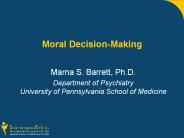Testing the Moral Violations Component of Fairness Theory: Moral Maturity as a Moderator of the Deon - PowerPoint PPT Presentation
1 / 17
Title:
Testing the Moral Violations Component of Fairness Theory: Moral Maturity as a Moderator of the Deon
Description:
Testing the Moral Violations Component of Fairness Theory: Moral Maturity as a Moderator of the Deon – PowerPoint PPT presentation
Number of Views:225
Avg rating:3.0/5.0
Title: Testing the Moral Violations Component of Fairness Theory: Moral Maturity as a Moderator of the Deon
1
Testing the Moral Violations Component of
Fairness Theory Moral Maturity as a Moderator of
the Deontological Effect
- Deborah E. Rupp
- - University of Illinois at
Urbana-Champaign
SIOP 2003, Orlando
2
Fairness Theory (Folger Cropanzano, 1998 2001)
- Three necessary processes that must occur for a
situation to be seen as unjust - Unfavorable condition (perceived alternatives
would have been better) - Perpetrator could have acted differently
- The harmful actions seen as a violation to some
ethical/moral norm of interpersonal treatment
(perpetrator should have acted differently)
fairness as deonance (Folger, 1998 2001)
3
Fairness as Deonance Being fair because we
ought to
- Accounts for third party reactions to injustice
- Deonic reactions morality-based responses to
discrepancies between what has occurred and an
internalized ethic of interpersonal behavior
(Folger Cropanzano, 2001) - Deonance An experience caused when motivated by
moral considerations (Folger, 2001) - Justice is more than a means to an instrumental
or relational end, it is also an end to itself
(Montada, 1998) - Justice as a moral virtue (Folger, 1998)
4
Empirical Support for the Model
- How to test
- Have respondents function as observers of a moral
transgression between 2 parties with whom they
have no relationship - Never know identity of either party, the victim,
or the perpetrator - If observer is willing to make a sacrifice in
order to seek retribution against perpetrator,
can only be doing so out of an internalized
justice motive (self-interest and relational
motives ruled out)
5
Empirical Support for the Model
- Kahneman, Knetsch, Thaler, 1986
- when allocating resources, individuals will
choose to allocate less for themselves if it is
the only way to withhold resources from someone
who has acted unfairly
6
Empirical Support for the Model
- Turillo, Folger, Lavelle, Umphress, Gee, 2002
- replicated findings and showed
- Publicity of decisions does not have a strong
effect - Two wrongs do not make a right
- Group identification does not have a strong effect
7
Aim of Current Study Identify Moderators
- What contextual and individual difference
variables might moderate the deontological
effect? - Moral Maturity?
- Cognitive Load?
- Value Preferences?
- Thoughts vs. Actions?
Will discuss today
Also Tested
8
Moral Development x Justice
- Folger (1998)
- people hold a collective morality-based norm of
fairness - those high in moral development will more
strongly internalize justice as a moral virtue - Greenberg (2002)
- found those high in moral development to be more
likely to comply to corporate ethics programs
9
Hypothesis Moral Development x Fairness
Information Interaction on Allocation Choice
Just
injustice present
Equality
Choice
no injustice present
Self-serving
Low
High
Moral Maturity
10
Methods
- N 315
- IV Knowledge of an injustice (yes/no)
- IV Moral maturity (SRM-SF Sociomoral Reflection
Measure-Short Form Gibbs, Basinger, Fuller,
1992) - DV Allocation choice
- Real money paid out
11
Payout Matrix
- In todays round, we are going to partner you
with two teammates and you are going to decide
how to divide a pool of money between the three
of youBecause of scheduling complexities, your
teammates will not be physically present today.
However, your teammates will be making requests
for the team using the same method employed
here.
12
Frequencies
13
Who is making these choices???
Allocation choice SRM SRM (w/knowledge of an
injustice) Mean Standard Dev Selfish
allocation 2.09 .31 Equal allocation 2.59 .
30 Sacrificial allocation 3.01 .27 (punishing
unfairness)
14
Moral Maturity Moderates the Deontological Effect!
Knowledge of an injustice
Allocation Decision
B -3.90 SE 1.95 Wald 3.81 R2 .24
Moral Maturity
15
Implications/Future Research
- Continued support for the should component of
Fairness theory - Some people will make sacrifices to punish
unfairness - These people are higher in moral maturity
- Norm of equality strongmore research needed
- Can moral stages be superimposed onto
organizational justices three
roads(Cropanzano, et al., 2001)?
16
END
17
- Interactions with fairness information
- IV effect on probability of
- choosing sac over equal B SE Wald R2
- cognitive load .44 .94 .22ns .19
- moral maturity -3.20 1.95 3.83 .24
- hedonism -.35 .17 4.44 .24
- self-direction -.19 .09 4.53 .24
- universalism .14 .07 3.28 .23































